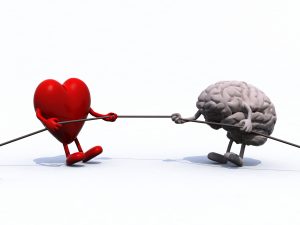Stress can manifest from many things. It can manifest from situations but also from relationships. Relationships can range from work to home to personal to romantic. Whenever people exist, the chance for conflict can exist. Conflict in itself is not bad but can become stressful when not properly resolved. Individuals need to learn about each other to reduce potential stress and infighting from differences and conflict.

Personality A and Personality B in themselves can cause issues but if we look deeper, we can find more indepth differences between people that result in conflict. People are different at large scales and when these differences in values or expressions manifest at work or in a relationship, they can produce conflict. In properly understanding other people and seeking to find solutions and compromises through questions, one can better resolve conflicts and produce beneficial results from them.
Karl Jung looked at differences in people as a source of stress from four conflicting personality traits.
The first was between extroverts and introverts. Extroverts naturally are more outgoing. They seek to meet new people, surround themselves with others socially and partake in activities. They are quicker to move and respond. Introverts on the contrary are less outgoing. They find discomfort being around multiple people and seek to avoid festivities. Introverts find more joy alone. They move more slowly. With 75 percent of the population extrovert, there is less chance to come into contact with introverts but it does occur. At work, extroverts and introverts can find conflict in how their personalities seek to resolve issues. Extroverts can reduce stress with introverts by encouraging them, while introverts can slow extroverts down through questioning.

The second preference is intuitive people and sensing people. Sensing people approach problems more analytically and search for facts before making decisions, while intuitive people relay on gut feelings. Sensing people systematically approach a situation while intuitive people may jump from place to place. The conflict is very understandable. 75 percent of the population is sensing, while 25 percent is intuitive. Both personalities need to see the merit of each other to solve the problem as a whole.

The third preference is judging and perceiving. Judging people are very objective while perceiving individuals are very subjective. Judging individuals will have a set plan while perceiving are more flexible and adaptable. Judging personalities wish to complete tasks and move on, while perceived personalities do not like to be rushed. This flexible and inflexible conflict can lead to stress unless both parties seek common ground and understanding.
The fourth preference is thinking and feeling. Many individuals make decisions based logical decision making instead of making decisions based on feelings. Emotions are critical in processing a decision for a feeler, while logic is more important for a thinker. Most men are thinkers and most women are feelers. Thinkers tackle situations with the term, “I think we should…” while feelers approach problems with the term “I feel we should…” While thinkers are cut off from feeling which is important, many feelers are stressed when making decisions due to immense emotion.
When looking for conflict resolution with less stress and great productivity, it is important that one identifies differences in people. If one can understand their own personality traits and that of whom they are working with, then conflict has a greater chance to be resolved. When one does not identify, then conflict has a greater chance of leading to stress and more problems.
Many individuals enter into conflict with more emotion than logic and set values. Sometimes the values or perceived sense of rules are even greater than the issue itself. It is important to understand each other and not allow extreme emotional responses to overtake.
It is far more than merely identifying differences of personality but also creating a integrative plan to find resolution. This involves four facets.
First, a healthy relationship must be established. This relationship must set ground rules and establish guidelines.
Second, there needs to be a clear statement of how each party feels.
Third, common goals must be established
Finally, a determination of range of alternatives and compromises must be established between the two parties.
Conflict can go either way but by establishing these guidelines, resolution has a far greater chance of success. Sometimes, however, no matter how hard we try, conflict cannot be resolved. Difficult and uncompromising people exist. When identifying difficult people, it is important to have a support group that you can trust and never stop working within your values. When one realizes they are dealing with the difficult personality, it is best to avoid confrontation and when forced to work with such an individual to pose more questions to them than declarative statements.

Ultimately, balance is key in everything. If one discovers they are too extrovert, they may wish to work on incorporating some introvert values, or if one is to rigid and judging, they may wish to balance that with more flexibility from time to time. Balance within oneself creates harmony but when working with others who value differently, we should sometimes try to see them as the balance we may need to make a better decision.
If you would like to learn more about Stress Management or would like to become a certified Stress Management Consultant then please review AIHCP’s Stress Management Consulting Certification Program and see if it matches your academic and professional goals. The program is online and independent study for qualified professionals seeking to learn more in this important field of Stress Management.

One can review the many Stress Management Courses by clicking the link.
Please also view our Anger Management Consulting Program. This program also contains vital information for stress reduction and conflict resolution between differing personalities.
